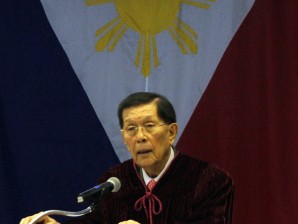Bangsamoro entity to test parliamentary system in PH – Enrile
MANILA, Philippines — Consider the Bangsamoro region as an experiment to see whether the parliamentary system of government would work in the country, Senate President Juan Ponce Enrile suggested on Tuesday.
Enrile said leaders of an earlier time wanted to exercise a parliamentary form of government but fate had other plans.
“Under the 1973 Constitution, we adopted a parliamentary system,” recalled Enrile, who was then defense secretary of President Marcos.
The period however, was also a time of martial law. Marcos had Congress padlocked then.
After Marcos fled in 1986, Enrile said framers of what became the 1987 Constitution also introduced a parliamentary system, “except that it was defeated by one vote” during deliberations of the Constitutional Commission. “That is why we (had) to redo the Constitution, and so it now includes numerous vague provisions,” he noted.
Article continues after this advertisement“So there is in fact, in the psyche of this country, the desire to adopt a parliamentary system,” the Senate President said.
Article continues after this advertisementEnrile surmised those responsible for the framework agreement between the government and the Moro Islamic Liberation Front (MILF) “think this would be a good experiment to find out how a parliamentary system of government will operate.”
Personally, Enrile supports the idea. “I’m not enforcing my opinion on others (but) I would risk this for this purpose and find out how good is a parliamentary form of government. This (Bangsamoro region) would be a model,” he said.
Senate constitutional amendments chair Miriam Defensor-Santiago earlier warned that setting up a parliamentary form of government in the Bangsamoro area would entail an amendment of the Constitution that has laid down specifically a presidential form of government with term limits.
She also foresees a second constitutional amendment to accommodate a federalized government for Bangsamoro.
Enrile said the Bangsamoro region would still be “under the President of the Republic of the Philippines.”
“The only thing they’ll have is their own parliament and their own Prime Minister probably who is actually acting in the place of (an Autonomous Region of Muslim Mindanao) governor,” the Senate President explained.
Chief government negotiator Marvic Leonen said Monday “whatever government is in the autonomous region, it shall always be under the supervision of the President.”
Still, Enrile assured the public that legislators would study carefully a proposed measure laying down the Bangsamoro “basic law” to legalize the region’s existence in the future.
“I understand that the agreement is not self-executing. It has to be translated into legislation,” he said.
“I think we have to give it a chance and we will study it very carefully before we start shooting it down,” Enrile added.
Senator Loren Legarda said the agreement should be subjected to close scrutiny and must undergo extensive consultations.
“While the important details of this agreement have yet to be formulated, as a legislator, I will carefully study the framework agreement and its subsequent companion documents to determine how this agreement conforms to the spirit and intent of our Constitution,” she said.
“There are provisions in the Framework Agreement that invite closer scrutiny and I trust that questions that may arise would be answered through a process of extensive consultations,” Legarda explained.
Asked to comment on the “ministerial form of government” stated in the framework agreement, Enrile said: “You can grant it…Right now, provinces also have their legislative bodies in the form of the provincial boards. Even the barangays have their own legislative bodies, even the municipalities.”
“Congress, I think, has the power to enact a law granting them this kind of system because (the people of Bangsamoro) are going to enact (laws) mostly on the basis of their Shari’ah and their economic circumstance in the area. That’s why they are given the power to tax,” he added.
Enrile noted that the possibility of amending the Constitution to accommodate certain requirements of the Bangsamoro region has been “provided in the (framework) agreement….to the extent that there is a need for it.”
“The same thing (a need to amend the Constitution) was provided in the Tripoli Agreement,” he added.
The Tripoli Agreement was a precursor of the framework agreement announced by Malacañang earlier this week.
In the early 1970s, Marcos’ widow, now Ilocos Norte Rep. Imelda Marcos, met with then Libyan leader Moammar Gaddafi when the Tripoli Agreement.
Enrile, who was defense secretary during that time, later warned Marcos that the Tripoli Agreement contained provisions that were unconstitutional, to Imelda’s displeasure.
Enrile said presidential adviser on the peace process Ging Deles briefed him on the framework agreement Monday.
“The way I understood it, when I was given a briefing by Ms. Deles, was that this is an improvement, a great improvement from the Tripoli Agreement and from the MOA-AD (Memorandum of Agreement on Ancestral Domain drafted during the Arroyo administration),” he said.
